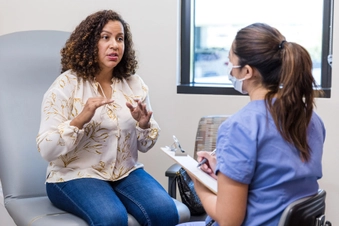Living With GPP: Cultivate a Proactive Mindset

Visible and Invisible
Generalized pustular psoriasis (GPP) is a rare condition that often includes patches on your skin. In severe cases, it can lead to inflammation as well as heart and kidney failure. It can be frustrating to have visible symptoms of GPP. Similarly, this condition can cause invisible symptoms that make it tough for people to understand how you feel.

Start Somewhere
It may be tough to talk about your GPP, but the people who care about you want to know how they can support you. Start by sharing information that you’re comfortable with and slowly build from there. Remember that everyone has something that they’re nervous to talk about with others. Once you find people you feel comfortable talking to, offer a listening ear to them as well.

Share the Facts
It may be helpful to let your friends, family, and even co-workers know that GPP is not contagious! They won’t “catch it” by being near you, touching you, or using any of your belongings.

Be an Open and Honest Partner
If your GPP impacts your private areas and you plan to be in a sexual relationship, talk to your partner about it. Make sure they know GPP isn’t a sexually transmitted infection (STI) and won’t spread to them. Check out organizations like the National Psoriasis Foundation for information on how to have this sensitive conversation.

Stay the Course
Accepting your condition doesn’t mean that you have to give up searching for the right treatment. Stay proactive in your communication with your doctor, in your appointments, and in tracking your symptoms.

Speak Up at Work
Symptoms like painful blisters, nausea, fatigue, and joint pain can impact your ability to work. Educate yourself on your disability rights and workplace accommodations under the Americans with Disabilities Act (ADA). Consider asking for accommodations and advocate for a supportive work environment if GPP impacts your job.

Squash the Stress
People with psoriatic disease are 39% more likely to have depression and 31% more likely to have anxiety than people without it. Left unchecked, these conditions can lead to substance abuse and other serious issues. Finding ways to manage stress should be a top priority.

Find a Hobby
Fun activities like knitting, photography, or reading can remind you that you’re more than your disease. They can take your mind off of negative thoughts. In fact, studies show that certain hobbies, like doing art, can lower cortisol (the stress hormone). They can also help you have a sense of accomplishment and find connection when meeting other people who share your same interests.

Choose the Right Time to Share
Finding the right time to talk about your GPP is just as important as how and why you choose to bring it up. Consider sharing when you’re feeling your best instead of when you’re going through a flare. Or, you might share when it serves a purpose – like explaining why you can’t attend a social function or that you need extra support at work. Just be sure to share when you feel ready.

Purpose Over Pain
Japan has some of the longest-living people in the world. Researchers believe one of their secrets to a long life is a concept called ikigai (pronounced ee-kee-guy). It’s a combination of the Japanese words iki (which means life) and gai (which means reason). The word stands for finding your reason for getting up in the morning. When you’re having a hard day with GPP, ask yourself these questions:
· What do you love?
· What are you good at?
· What does the world need from you?
· What can you get paid for?
Show Sources
IMAGES PROVIDED BY:
1) iStock/Getty Images
2) E+/Getty Images
3) E+/Getty Images
4) DigitalVision/Getty Images
5) E+/Getty Images
6) E+/Getty Images
7) Moment/Getty Images
8) E+/Getty Images
9) E+/Getty Images
10) DigitalVision/Getty Images
SOURCES:
National Organization for Rare Diseases: “Generalized Pustular Psoriasis.”
National Psoriasis Foundation: “Relationships,” “Genital Psoriasis Guide,” “When Psoriasis Impacts the Mind.”
American Journal of Clinical Dermatology: “Clinical Course and Characteristics of Generalized Pustular Psoriasis.”
Cleveland Clinic: “Pustular Psoriasis.”
Psychology Today: “Why Hobbies Matter In Chronic Illness.”
Utah State University: “How Hobbies Improve Mental Health.”
National Alliance on Mental Health: “Disclosing To Others.”
World Economic Forum: “Is this Japanese concept the secret to a long, happy, meaningful life?”